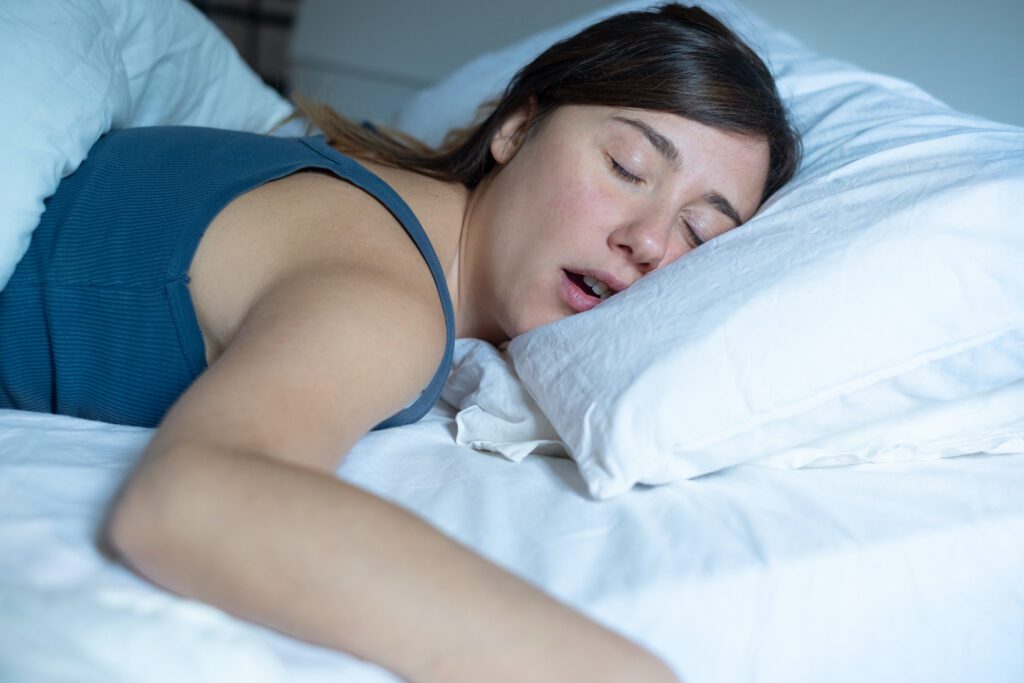Obstructive sleep apnea is a common condition that affects millions annually. While we sleep, our mouths and throats begin to relax, helping our bodies recover. But this can also cause involuntary movement of soft tissues in the back of our mouths, which may collapse into our airway. The lack of airflow causes difficulty breathing, resulting in a repeated cessation of normal breath that can affect sleep quality and health over time. If you suffer from sleep apnea in Washington, DC, you may be surprised to learn that your dentist can help.

Symptoms of Sleep Apnea
Because sleep apnea occurs while we’re unconscious, we can’t always tell when it’s happening. However, there are a few symptoms that can point towards sleep apnea.
- Excessive snoring
- Chronic fatigue
- Waking up regularly through the night
- Excessive drooling at night
- Waking up with a dry mouth or a sore throat (caused by sleeping with the mouth open)
Your dentist may also notice physical signs of sleep apnea while performing your yearly dental exam.
How Dentists Treat Sleep Apnea in Washington, DC
Although there is no complete cure for sleep apnea, there are effective treatment methods that can help reduce the symptoms and provide better sleep. The most common is the use of CPAP therapy. But CPAP isn’t an option for everyone, and it doesn’t always work. For patients who need additional sleep apnea aid or alternative treatment, dental oral appliances are available.
These oral treatment options are custom-made, much like a nightguard. They help adjust your jaw and tongue to allow an easier time keeping your airway clear. Your dentist may identify certain signs of sleep apnea during your exam and suggest one of the following treatment options to help.
Mandibular Advancement Devices
A mandibular advancement device (MAD) keeps your lower jaw and tongue stable throughout the night. By maintaining a slightly forward push, the soft tissue in the back of your mouth can’t constrict your airways because it’s being pulled forward. MADs are bulky mouthpieces, much like an athletic mouthguard. While learning to adjust to sleep with one can be difficult, your dentist can adjust your personalized MAD to provide better comfort and effectiveness for treating mild sleep apnea.
Tongue-Retaining Mouthpieces
For patients who have lower jaw flexibility, a MAD can cause extreme discomfort and even pain. Instead, dentists will use a tongue-retaining mouthpiece. This kind of oral device fits around the tongue and uses light suction to help hold it forward in your mouth while you sleep. This prevents the tongue from sliding back when your mouth relaxes, keeping your airways clear.
Is Oral Treatment for Sleep Apnea Right for You?
Most medical professionals agree that CPAP treatment is the best way to treat moderate-to-severe sleep apnea. But if you are intolerant of a CPAP machine, an oral device may help. Oral treatment for sleep apnea in Washington, DC, is most effective for mild sleep apnea, but it can also help reduce the symptoms of more complex cases.
At Foxhall Smiles, we believe that everyone deserves a healthy mouth and a good night’s sleep. If you’re struggling with sleep apnea, make an appointment today with Dr. Joseph A. Catanzano to see if oral treatment is right for you.
